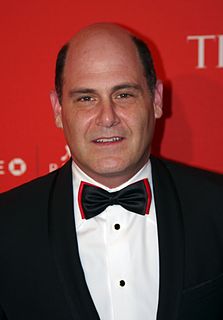A Quote by Terry Pratchett
Siren voices tell me, 'You don't have to keep going on.' And then you think, 'I'm a writer. What do I do? Sit there watching my wife clean up?' I don't know. I like being a writer.
Related Quotes
I say "on principle" [regarding 'lesbian writer'] because whenever you get one of your minority labels applied, like "Irish Writer," "Canadian Writer," "Woman Writer," "Lesbian Writer" - any of those categories - you always slightly wince because you're afraid that people will think that means you're only going to write about Canada or Ireland, you know.
I'm not a sketch writer. I know what I am: I have a sensitive comedic sensibility. What turns me on is subtle neurosis. That's my game. I'm not an action writer or a thriller writer and I'm not a sketch writer. I don't pretend to be those things. Then it would not be fun. Then you are in a space where this is painful.
If you're going to be a writer you should sit down and write in the morning, and keep it up all day, every day. Charles Bukowski, no matter how drunk he got the night before or no matter how hungover he was, the next morning he was at his typewriter. Every morning. Holidays, too. He'd have a bottle of whiskey with him to wake up with, and that's what he believed. That's the way you became a writer: by writing. When you weren't writing, you weren't a writer.
I'm capable offstage of having some dark, twisted thoughts but the kind of things I like to do onstage are just more conceptual and I don't even think of them as being clean. I don't sit down and think, "Man, I'm going to come up with some lily-white comedy!" They're just things that I like to talk about, and then at the end of the day you think, "Well, I guess that was clean" but it's not the focus.
It's not possible to advise a young writer because every young writer is so different. You might say, "Read," but a writer can read too much and be paralyzed. Or, "Don't read, don't think, just write," and the result could be a mountain of drivel. If you're going to be a writer you'll probably take a lot of wrong turns and then one day just end up writing something you have to write, then getting it better and better just because you want it to be better, and even when you get old and think, "There must be something else people do," you won't be able to quit.
Between me and my wife, there's this joke where I'll be doing some fun interview, and I'll get off the phone and be like, "That guy was an idiot." A lot of times, interviews are like being asked a list of questions. Invariably, there will be this part where they think you're a writer for Letterman: "Just off the top of your head, tell me the 10 most influential bands on you." And you're actually asked to come up with a spontaneous list. It's like, "Dude, I'm not living in High Fidelity."
It's hard to tell if I've had writer's block because it seems to me that it's when nothing comes, but, you know, every day you stare at that computer screen, and I think, 'It's never going to happen today. How can I write three pages?' And the hours pass, and they haven't shown up, and then at the very end it always happens, so it's willpower.
Once rehearsals are done the writer really doesn't have a function on the set. If the script is stabilized, then the writer becomes a celebrity tourist visiting the set, trying not to get in the way. It's very good for the ego, to go visit a film set if you are the writer, because they give you a special chair, and tell you where you can sit to watch the monitor. They make you feel special, but at the same time, they make it perfectly plain that you are irrelevant!


































